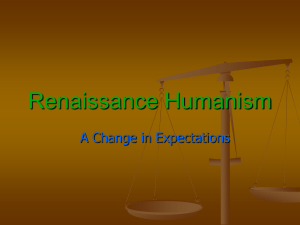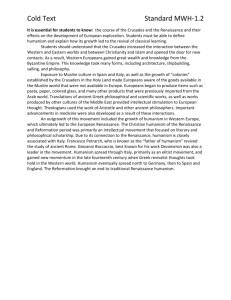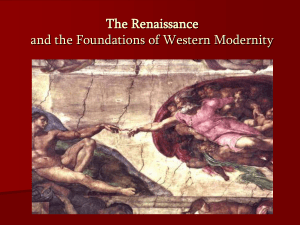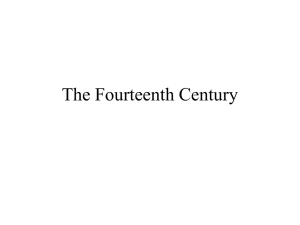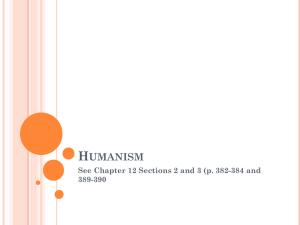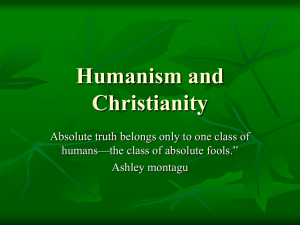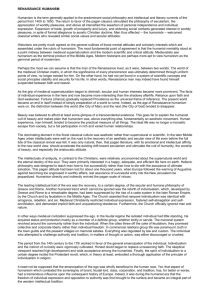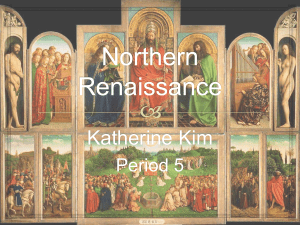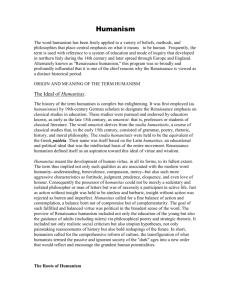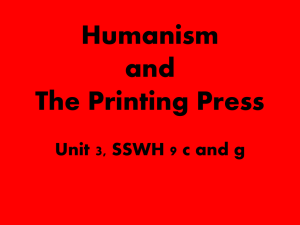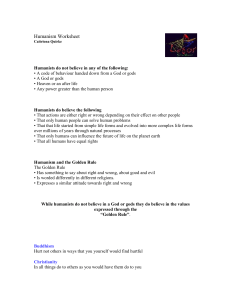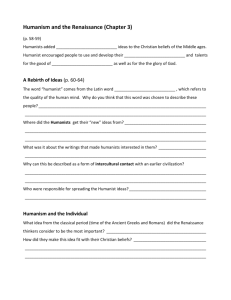Humanism
advertisement
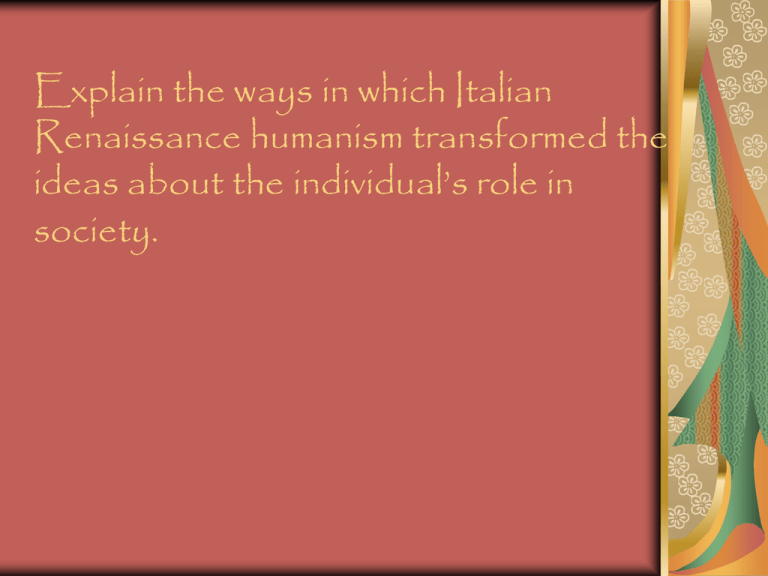
Explain the ways in which Italian Renaissance humanism transformed the ideas about the individual’s role in society. In the beginning there was… …Humanism Francesco Petrarch (1304-1374) “Father of Humanism” secular views Private scholar; not a clergyman Rekindles interest in the ancient Greek and Latin classics Investigates info. from source, not traditional Renaissance Humanism Curriculum based on Liberal studies: grammar, poetry, rhetoric, history, politics, and moral philosophy Belief that study of the classics is path to virtuous and balanced lifestyle and personality Importance in human, not divine, matters Information gathered from source, not traditional Devoted majority of life to the discovery and practice of the classics Anti-”scholasticism”, which was the educational curriculum of the medieval times. Religion Before Humanism Catholicism dominates people’s lives Criticism crushed No “other religions” hold any strength Catholic Church “monopolized” religion in europe Humanists on Religion Criticize the Catholic Church about mistakes, misinterpretations, and corruption Liberal knowledge was used to denounce church often in literary works that circulated Europe Criticize the Church’s written sources, such as the Vulgate, writings by the Church Fathers, and many other important religious documentation. Lorenzo Valla (1406-1457) Pope attempted to assert lands from the King of Naples through the Donation of Constantine Used knowledge of Latin to prove the document was a forgery by the Church Demonstrated that Latin expressions and patterns varied with time period Desiderius Erasmus (14661536) Wrote many anticlerical satires and dialogues Revised the Vulgate Translated the New Testament into Greek and lay Strong on church reform, believed that early bible and classic study the best reform Erasmus and the Reformation Wrote mostly against the church and its corruptness Criticized the Catholic institution and the turmoil, chaos, and selfish corruption taking place within it Although he was not a Lutheran and denied being so, he wanted Catholic reform, not its replacement How this affected individuals Catholic Church and her clergymen became more “exposed” and lost reverence Loses a lot of influence in the general populace’s daily life Lutherans began to acquire more ground Humanist works credited by later reformations Society Before Humanism People acted like children; there was very little personal upkeep or manner expectations Women were excluded from many social “gatherings” Birth was the defining point for social standing and status Education and personal capability didn’t exist within the social developments of medieval society Humanists on Society Humanists believe one should uphold personal manners and good-behavior Many humanists published guides and manuals for being a successful courtier Believe that education and universal capability should contribute to social success Christine de Pisan (1363-1434) The Treasure of the City of Ladies, “Renaissance woman’s survival manual” Spread humanism to French courts Helped to incorporate women more importantly into courts Baldassare Castiglione Very influential in Renaissance courts Believed to be a successful courtier; polite, balanced, skilled; by peers The Book of the Courtier, a guide to proper etiquette and manners in courts, as well as perquisites for being a “successful courtier” How this affected individuals Transformed society from “barbaric” to “civilized” Women introduced to balance male “manliness” with female “tenderness” Personal qualifications play greater role in status, giving initiate for “bettering oneself” Birth loses some substance Preceded gentry, forerunners Intellectual Humanists on Intellect Liberal arts introduced: grammar, poetry, rhetoric, history, politics and moral philosophy more practical, useful than scholasticism Education offered to wide audience Rekindled interest and influence of Greek and Roman classics Incorporated a necessity for literary truth, original and “uncorrupted” Desire to investigate info. at source creating large collections of original manuscripts Brought a greater purpose to learning: virtue and balance in life through study of classics Before Humanism Educated men were clergymen “Schools” were places to learn of God and spreading his will Educational curriculum was scholasticism Abstract and unpracticed; useless Educational power was held by few, allowing manipulation of lay peoples How this affected individuals No longer just clergymen Humanism replaced scholasticism New universities and humanist academies offer greater education As well as learning, students gain a greater virtuous and balanced personality With larger girth of education, powers less able to use it to manipulate subjects
